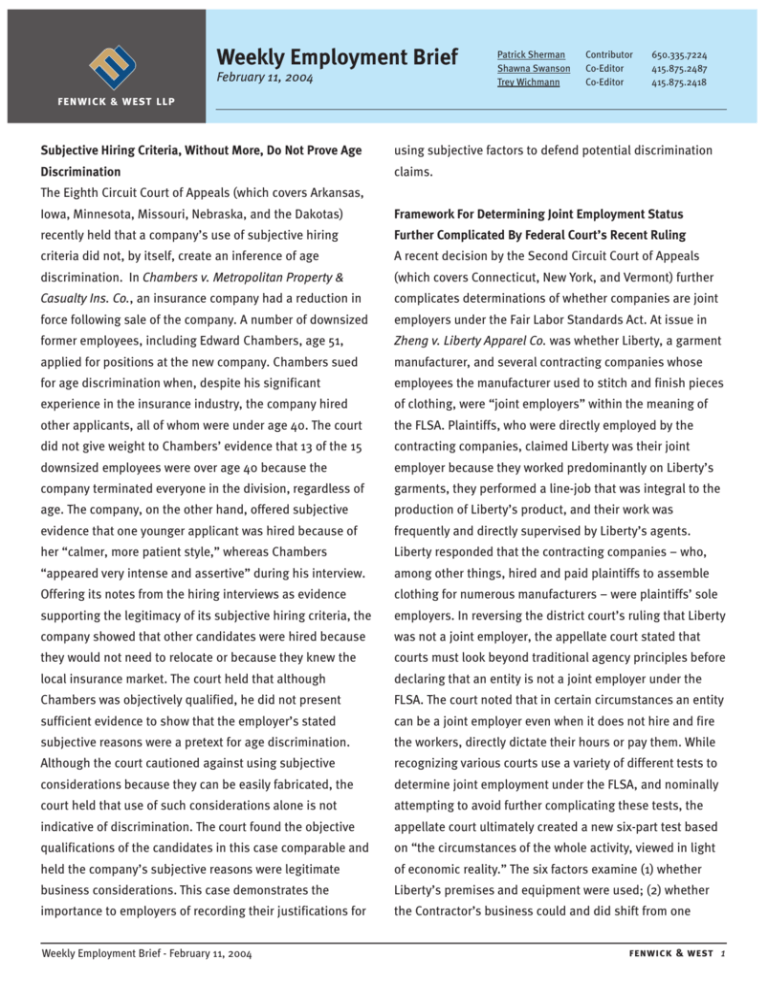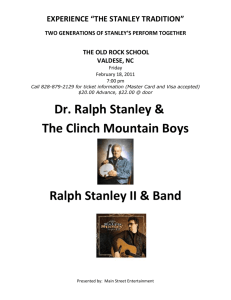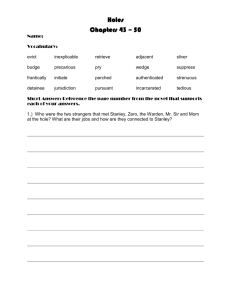
Weekly Employment Brief
February 11, 2004
Patrick Sherman
Shawna Swanson
Trey Wichmann
Contributor
Co-Editor
Co-Editor
650.335.7224
415.875.2487
415.875.2418
fenwick & west llp
Subjective Hiring Criteria, Without More, Do Not Prove Age
using subjective factors to defend potential discrimination
Discrimination
claims.
The Eighth Circuit Court of Appeals (which covers Arkansas,
Iowa, Minnesota, Missouri, Nebraska, and the Dakotas)
Framework For Determining Joint Employment Status
recently held that a company’s use of subjective hiring
Further Complicated By Federal Court’s Recent Ruling
criteria did not, by itself, create an inference of age
A recent decision by the Second Circuit Court of Appeals
discrimination. In Chambers v. Metropolitan Property &
(which covers Connecticut, New York, and Vermont) further
Casualty Ins. Co., an insurance company had a reduction in
complicates determinations of whether companies are joint
force following sale of the company. A number of downsized
employers under the Fair Labor Standards Act. At issue in
former employees, including Edward Chambers, age 51,
Zheng v. Liberty Apparel Co. was whether Liberty, a garment
applied for positions at the new company. Chambers sued
manufacturer, and several contracting companies whose
for age discrimination when, despite his significant
employees the manufacturer used to stitch and finish pieces
experience in the insurance industry, the company hired
of clothing, were “joint employers” within the meaning of
other applicants, all of whom were under age 40. The court
the FLSA. Plaintiffs, who were directly employed by the
did not give weight to Chambers’ evidence that 13 of the 15
contracting companies, claimed Liberty was their joint
downsized employees were over age 40 because the
employer because they worked predominantly on Liberty’s
company terminated everyone in the division, regardless of
garments, they performed a line-job that was integral to the
age. The company, on the other hand, offered subjective
production of Liberty’s product, and their work was
evidence that one younger applicant was hired because of
frequently and directly supervised by Liberty’s agents.
her “calmer, more patient style,” whereas Chambers
Liberty responded that the contracting companies – who,
“appeared very intense and assertive” during his interview.
among other things, hired and paid plaintiffs to assemble
Offering its notes from the hiring interviews as evidence
clothing for numerous manufacturers – were plaintiffs’ sole
supporting the legitimacy of its subjective hiring criteria, the
employers. In reversing the district court’s ruling that Liberty
company showed that other candidates were hired because
was not a joint employer, the appellate court stated that
they would not need to relocate or because they knew the
courts must look beyond traditional agency principles before
local insurance market. The court held that although
declaring that an entity is not a joint employer under the
Chambers was objectively qualified, he did not present
FLSA. The court noted that in certain circumstances an entity
sufficient evidence to show that the employer’s stated
can be a joint employer even when it does not hire and fire
subjective reasons were a pretext for age discrimination.
the workers, directly dictate their hours or pay them. While
Although the court cautioned against using subjective
recognizing various courts use a variety of different tests to
considerations because they can be easily fabricated, the
determine joint employment under the FLSA, and nominally
court held that use of such considerations alone is not
attempting to avoid further complicating these tests, the
indicative of discrimination. The court found the objective
appellate court ultimately created a new six-part test based
qualifications of the candidates in this case comparable and
on “the circumstances of the whole activity, viewed in light
held the company’s subjective reasons were legitimate
of economic reality.” The six factors examine (1) whether
business considerations. This case demonstrates the
Liberty’s premises and equipment were used; (2) whether
importance to employers of recording their justifications for
the Contractor’s business could and did shift from one
Weekly Employment Brief - February 11, 2004
fenwick & west 1
garment manufacturer to another; (3) the extent to which
headquarters. Stanley, too, remained stationed primarily in
plaintiffs performed a discrete line-job that was integral to
California, but he also traveled regularly to Minnesota. In
Liberty’s process of production; (4) whether responsibility
April 2003, West fired Stanley. Under the separation
under the contracts could pass from one subcontractor to
agreement, which Stanley executed in California, Stanley
another without material changes; (5) the degree to which
agreed not to compete with West or solicit or hire West
Liberty or its agents supervised plaintiffs’ work; and (6)
employees for one year. The separation agreement did not
whether plaintiffs worked exclusively or predominantly for
contain a choice of law or forum selection clause. Despite
Liberty. California employers should note that Moreau v. Air
the agreement, Stanley later incorporated a competing
France (reported in the September 30, 2003 issue of the
business in Nevada. In September 2003, West filed an
WEB), the most recent Ninth Circuit case on this issue,
action in federal court in Nevada alleging that Stanley
employed a slightly different test that focused on the
violated the agreement’s non-compete provisions. Stanley
potential joint employer’s power to hire and fire, determine
objected to the action on the grounds that jurisdiction and
the rate or method of payment, set or control work
venue were both improper. While the Nevada action was
schedules or conditions of employment; the degree of
pending, Stanley filed an action against West in California
supervision and control exercised by the alleged joint
state court seeking a judicial declaration that the non-
employer; and the amount of time the workers spent on its
compete was unenforceable under California law. The
premises. Until the Supreme Court resolves the differences
Nevada court refused to enter a preliminary injunction
between the Circuits, employers should be aware that the
against Stanley due, in part, to concerns over jurisdiction
outcome of the joint employer inquiry will depend on where
and venue. Thereafter, West voluntarily dismissed the
they operate.
Nevada action and filed suit in federal court in Minnesota in
November 2003. The Minnesota court held that venue was
Minnesota Court Enforces Non-Compete Agreement Against
proper, that Minnesota law applied to the dispute and that
Former California Employee
Stanley had sufficient contacts with the state to establish
In a case illustrating the complexities of litigating
personal jurisdiction. The court held that although venue
noncompete agreements, a Minnesota Court enforced an
would also be proper in California, Stanley had not
agreement against a former employee residing in California.
demonstrated that the balance of the factors “strongly”
In West Publishing Co. v. Stanley, West sought a preliminary
favored transfer to California. The Court therefore denied
injunction to enforce noncompete provisions of an
Stanley’s motion to transfer. It then determined that West
agreement with a former employee, Timothy Stanley.
was entitled to a preliminary injunction to enforce the
Stanley argued the action should be dismissed because
agreement. This case illustrates the complications that can
personal jurisdiction and venue were improper in
arise in drafting and enforcing noncompete agreements
Minnesota. Alternatively, he sought to transfer venue to
where all parties do not work and reside in the same state.
California. Stanley was a co-founder of FindLaw, a
Employers should confer with counsel to determine whether
California-based business that provides services to
to insert choice of law and/or choice of venue provisions
attorneys, which was acquired by Minnesota-based West in
when drafting such agreements.
January 2001. After the acquisition, FindLaw’s headquarters
remained in California, although several key executives
©2004 Fenwick & West LLP. All rights reserved.
supervised its operations from West’s Minnesota
THIS WEEKLY EMPLOYMENT BRIEF IS INTENDED BY FENWICK & WEST LLP TO SUMMARIZE RECENT DEVELOPMENTS IN EMPLOYMENT AND LABOR LAW. IT IS NOT INTENDED, AND SHOULD
NOT BE REGARDED, AS LEGAL ADVICE. READERS WHO HAVE PARTICULAR QUESTIONS ABOUT EMPLOYMENT AND LABOR LAW ISSUES SHOULD SEEK ADVICE OF COUNSEL.
Weekly Employment Brief - February 11, 2004
fenwick & west 2






